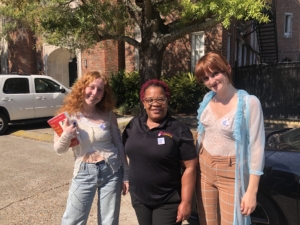Immigration
The Working Catholic: Immigration by Bill Droel
The immigrant “can sense that the United States is of two minds,” writes Hector Tobar of the University of California in Our Migrant Souls: A Meditation (Farrar, Straus, 2023). “Like the indentured servants, the Poles, the Germans and the Chinese people of other centuries, she knows there are factory owners and affluent families on the other side of the fence or the ocean who really want her to make it across… She knows that she has something that is prized on the other side.” At the same time the “walls, barbed wire and restrictive immigration laws announce they hate her kind.”
A country by definition must have borders. A phrase like open borders, if taken literally, erases the existence of nation states. The trick is to maintain an orderly system so that tourists, students, temporary workers, immigrants and refugees can safely enter a country and by their labor, knowledge and consumption they can contribute to their surroundings.
The current number of foreign-born people living in our country is the highest it has been in about 100 years; 45million by one estimate, reports Idrees Kahloon in The New Yorker (6/12/23). Many are immigrants who have become full-fledged legal U.S. citizens (about 970,000 within the past 12 months). Other foreign-born residents are guest workers (in Silicon Valley, in hospitals, in vineyards and on farms) and students (in technical fields, medical research and business) and others are immigrant/refugees–those who are in the legal process and those who have drifted into society without status.
The current influx actually began over 60 years ago when Congress changed its immigration limit and its general ban on those from Asia, details Dexter Filkins, also writing in The New Yorker (6/19/23). Our society’s need for more skilled and manual laborers attracts foreigners. More arrive under our policy of family preference or chain migration by which one immigrant can assist family members. Several factors push families toward the U.S., including drug violence, natural disasters, a bad economy at home, oppressive politics, the profitable smuggling/trafficking business (coyote cartels) and more.
Arrivals in the U.S., as Hector Tobar describes, have always encountered nativism. Some current U.S. residents say that their life would be better if immigrants were not unfairly given social services. Some residents also say that their own ancestors had to learn English, but that today’s arrivals don’t do so. They also say that new arrivals take away jobs that longer-standing residents would like to have.
Data can counter these points, but the objections are not really about what they are about. The concern about jobs, for example, is only valid for a limited time in a specific place where “cheap labor can hold down wages for some workers,” says Filkins. However, the demand for employees in our country far exceeds the current supply. In the bigger picture immigration has no effect on jobs or wages. It is employment sectors that set wage scales and it is free trade and tax policies that send jobs overseas. Yet no one opposed to today’s immigrants is persuaded by the facts.
Migrants and refugees crossing our country’s southern border are resented more than well-educated technicians and doctors and trades people arriving from Asia or Eastern Europe, though each foreigner encounters nativism.
“Determining the exact number [of refugees is] remarkably difficult,” Filkins explains. There are possibly 11million undocumented people in the U.S. today; not all of whom intend to stay or will be allowed to stay. Even now our government does not know how many migrants it has sent back. The legal process for entry is backlogged and caught-up in conflicting court rulings. There are over two million pending cases just for those who claim refugee status. They are legally entitled to wait in the U.S. for a hearing on their case, but they have no right to a public defender. The wait time for the initial hearing is now five years. If the decision is unfavorable to the refugee, they can appeal. The wait time for that appeal hearing is another five years.
Reform of our dysfunctional immigration/migration system is, as any objective observer realizes, slow-going. A policy of exclusion, Filkins explains, is impractical. No matter how big a wall is built, people are not deterred from fleeing misery and staking their hope on our beautiful country. Total exclusion also damages the U.S. economy plus betrays the story of our country and it is inhumane. Three parts must come together simultaneously for acceptable reform. 1.) Tougher boarder security. 2.) More funding for local police in states like Texas and Arizona plus in cities that welcome migrants; more social services and processing assistance; more immigration judges. 3.) Better legal opportunities for immigrants, enforced fairly.
At the moment both Republican and Democrat leaders tolerate the frustrating chaos because they can blame one another. Additionally, Democrats and Republicans share the ambivalence of our citizenry. They want more immigration because it bolsters U.S. productivity. They want less immigration because more of it fuels resentment and politicians get the blame.
A final consideration: No matter the administrative chaos and the political muddle of the moment, there is an ethical obligation to assist the immigrants/migrants among us. To be continued…
Droel serves the board of National Center for the Laity (PO Box 291102, Chicago, IL 60629)

